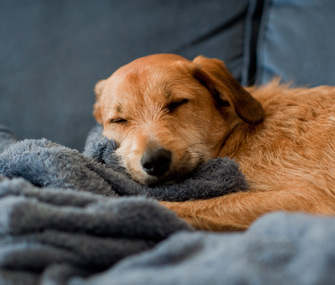How to Get Your Dog to Sleep In
Published on September 27, 2012

Unfortunately, your dog isn’t as easy to set as the clocks. Wait an hour for breakfast? Not in his world! It's time to get up!
Most dogs will adjust to the time change within a few days, but others will continue to demand that you get up and at 'em at the old time for weeks without realizing — or caring — that for you, there’s still another hour to go before the day starts. And some dogs are just early risers by nature, regardless of where we are in the daylight saving calendar. Can you adjust your dog's internal clock? You probably can, and here’s some help.
When Not to Expect Your Pooch to Sleep In
If your dog is a puppy, you’ll need to listen to him when he asks to go out, no matter what the time. That’s because puppies don’t have the ability to “hold it” the way a healthy adult dog can. When you’re house-training a puppy, you must give him every opportunity to do what you are asking of him. That means if he needs to go out in the middle of the night and again at 4 a.m., out you both go. Don’t be a grump: Your pup is doing what you want him to do, so be full of praise for him when he does.
Likewise, you’ll need to cut an older pet some slack. Those of you out there with AARP cards know what I’m talking about. Sometimes, as we get older, sleeping through the night without a potty break becomes the Impossible Dream. The same can apply to older pets, although your veterinarian can help with some chronic problems that cause urine leaking, so please discuss these issues with your pet's doctor.
And finally, realize that any sudden change in drinking or urination may be a symptom of disease in a pet of any age. If your pet's demands to go out are not obviously related to a time change, talk to your veterinarian right away.
Encourage Later Waking With Daytime Adjustments
Assuming there are no age- or health-related complications, you can prepare your pet for the time change by altering your routines and giving him some good reasons to keep sleeping. You will also need to shore up your own resolve to make it all work.
More exercise would be a good place to start. As a veterinarian, I know the vast majority of dogs aren’t getting enough exercise, just like their owners. Most dogs need a good half hour of heart-thumping exercise every day, and those who don’t get it aren’t going to be as likely to fall into a deep, restful sleep. (They’re also more prone to being overweight or obese, with all the accompanying health problems — another issue in human health that has crossed over to our pets.) The days are getting shorter and cooler, which makes this a great time to put on some reflective gear and get out for a walk with your dog after work. There’s just no downside to it, and it’ll help you both sleep better.
Next, start moving your dog’s meals back 15 minutes at a time. Adjust feeding time, stick with that time for a few days, and then move his dinner back another 15 and so on until he's eating an hour later each morning. That goes for the evening meal as well as breakfast. If you feed your dog from a bowl, I recommend switching to food puzzles. I’m a strong advocate for food puzzles generally, but they really fit in well here, since they’ll keep your dog’s mind and body busy and help tire him out, which makes him more likely to sleep in.
Ignore the Canine Wake-Up Call
Now we come to the hardest part of all: ignoring your dog in the morning. The truth is that many dog owners have only themselves to blame for their canine pests. If you stop paying attention to your dog when he nuzzles, whines, barks or otherwise works all the angles to get you out of bed on his schedule — probably hoping for his breakfast — you’ve taught him that all that nagging works.
Remember, you are in charge here; your dog should never be allowed to demand that you stop what you’re doing to feed him a meal. It’s the same as with begging: When a dog is rewarded with food for behavior you don’t want, he’ll keep up that behavior. If you have a demanding dog, ignore him completely. If you give in even once, you’ll be guaranteeing he’ll become an even bigger pest. That’s because random reinforcement strengthens behaviors — it’s what keeps people pushing the buttons on slot machines. A little reward here and there builds hopes of the big payoff.
Send a different message, and be firm about it. He’ll actually get worse with the pestering before he gets better — the escalation of unwanted, unrewarded behavior before it goes away is called an “extinction burst” — but he will eventually get the point and let you sleep in.
Once that happens, you’ll be waking him up when the clocks move forward again in a few months.
Google+
